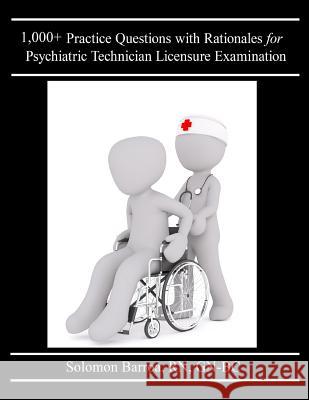1,000+ Practice Questions with Rationales for Psychiatric Technician Licensure Examination » książka
1,000+ Practice Questions with Rationales for Psychiatric Technician Licensure Examination
ISBN-13: 9781548663285 / Angielski / Miękka / 2017 / 360 str.
The path to becoming a Psychiatric Technician is not easy. It requires completion of courses, clinical exposure, and passing the licensure examination. The completion of courses must be from an approved or accredited Psychiatric Technician program. Courses include 396 hours of education in nursing science, 54 hours in pharmacology, 378 in mental disorders, 378 in developmental disabilities, and 324 hours for other courses such as anatomy, physiology, nutrition, leadership, and management. The above requirements encompass classroom theory and supervised clinical exposure. This book contains 1,096 practice questions with rationales broadly and explicitly covering nursing science, gerontological nursing, basic anatomy and physiology, pharmacology, basic nutrition and dietetics, medical terminologies, mental health including theories of personality, defense mechanisms, psychosocial tasks, developmental disabilities, anxiety disorders, affective disorders, organic brain syndromes, mood disorders, personality disorders, eating disorders, substance abuse disorders, schizophrenia, sexual issues, psychopharmacology, psychotherapy, therapeutic techniques of communication, and other important topics. It is not intended to reflect the exact questions of the Board examination. The author's intention is to provide effective review material for the reader. Various levels of difficulty are reflected in this book. There are easy and difficult questions. Sample Questions: 1. Self-control is a goal for a male pediatric client with autism. The client frequently scratches his neck causing bleeding and infection. Which of the following is appropriate for this type of client? (a. the client is encouraged to look for a staff before rubbing his neck b. the client will wear padded mittens c. restraints will be used when the client scratches d. the client will be reprimanded when he scratches) 2. Feeding tubes sometimes get clogged. Which of the following causes the clogging? (a. thin watery formula b. warm temperature c. powdered medication d. none of the above) 3. The Psychiatric Technician charted that a 78-year-old client on her shift was doing lip smacking and picking at clothes before briefly losing consciousness. The client also became amnestic about what had happened after consciousness was regained. The Psychiatric Technician knows that they are characteristics of which type of seizure? (a. complex partial seizure b. simple partial seizure c. atonic seizure d. akinetic seizure) 4. A client with severe mental disorder had undergone ECT (electroconvulsive therapy). The Psychiatric Technician is monitoring for adverse reactions from the procedure. Which of the following may occur? (Select all that apply) (a. intestinal obstruction b. Klinefelter's syndrome c. hypotension d. arrhythmia e. confusion f. paresthesia) 5. Absorption of food is accomplished by the digestive system. Which of the following parts of this system is responsible for mechanical digestion? (a. gallbladder b. intestine c. mouth d. pancreas) 6. A male client with severe depression lost weight, speaks little, spends time immobile, and pays little attention to appearance. A day later, the client came to lunch with combed hair and dressed properly. Which of the following is the best response from the Psychiatric Technician? (a. "You must be feeling better. You look much better than yesterday" b. "This is the very first time I've seen you look good" c. "What happened to you? Your hair is suddenly combed" d. "I see that your hair is combed and dressed well") 7. Benzodiazepine was administered to a client with anxiety disorder. Therapeutic effects are being monitored. Which of the following actions may be exerted by this class of drug? (Select all that apply) (a. anticonvulsant b. temporary paralysis c. skeletal muscle relaxation d. daytime sedation e. cessation of salivation f. sleep inducement) More questions inside and the answers.
Zawartość książki może nie spełniać oczekiwań – reklamacje nie obejmują treści, która mogła nie być redakcyjnie ani merytorycznie opracowana.











